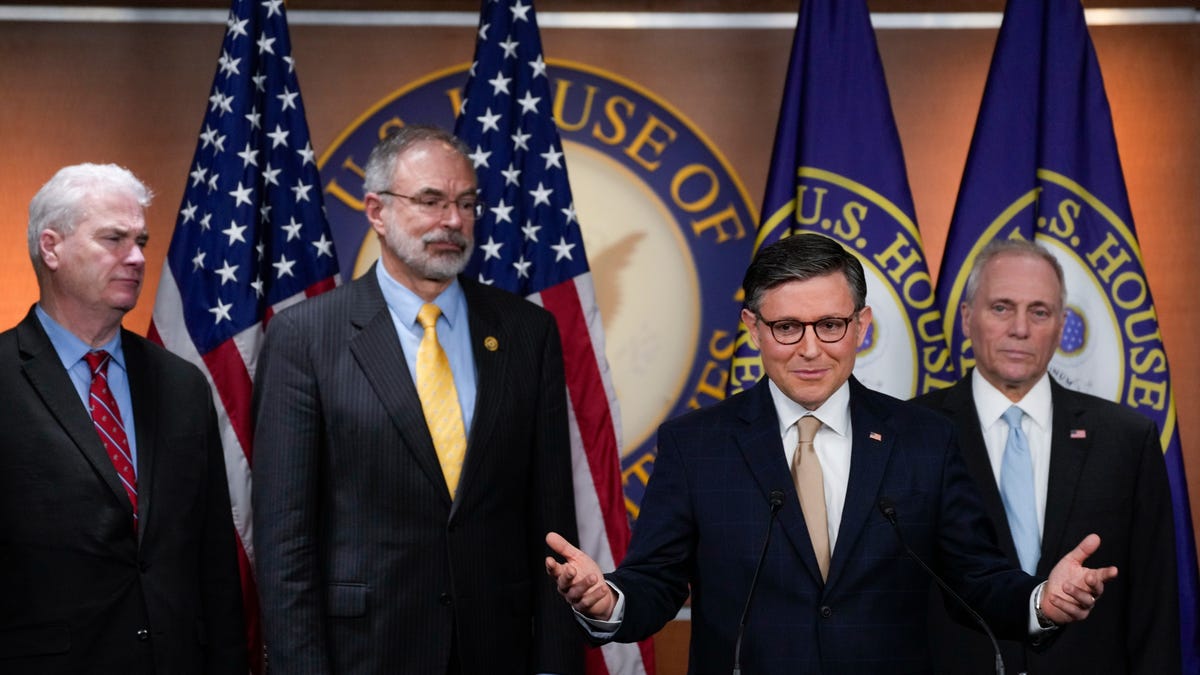Hours of debate will be followed by likely hours of voting on what could be dozens of amendments.

Senate votes to move forward with tax and spending bill
President Trump’s bill passed a key procedural vote in the Senate. Lawmakers voted 51-49.
- The Senate began the hours-long debate over Trump’s legislative priorities June 28.
- Elon Musk, Trump’s former adviser, blasted the bill as ‘political suicide’ before the Senate debate began.
- The Senate aims to send the bill back to the House for approval. Trump has asked Congress to complete the bill by July 4.
WASHINGTON – The Senate is getting closer to voting on President Donald Trump’s package of legislative priorities as Republicans try to thread the needle for tax cuts, Medicaid reforms and border security funding with a narrow majority.
Senators are currently debating the bill in a process that could last up to 20 hours. Next, they’ll begin voting on what is expected to be dozens of amendments in a process nicknamed a “vote-a-rama” that could last hours longer.
The legislation cleared a key hurdle late Saturday night, receiving a tight 51-49 vote in the Senate that took more than three and a half hours while a handful of Republicans negotiated with Senate leaders, Trump and Vice President JD Vance.
Still, that wasn’t the final passage the bill needs to head to Trump’s desk. Instead, after the vote, Minority Leader Chuck Schumer, D-New York, forced Senate clerks to read the entire 940-page bill rather than customarily waiving that chore.
Majority Leader John Thune, R-South Dakota, has said he is uncertain whether enough Republicans will support the final version of their bill to send it back to the House. Sens. Rand Paul of Kentucky and Thom Tillis of North Carolina were the only Republican votes against debating the bill as written.
“We’ll find out,” Thune said.
Here is what has happened so far:
After the bill is read
The Senate clerk has finished reading the 940-page, foot-high Senate version of the Trump-backed bill. Next, there will be up to 20 hours of debate split evenly between the parties.
Democrats are expected to use up most of their time, while Republicans are not. Once that is complete, the Senate will begin hearing potential amendments to the bill, most of which will likely fail.
A final vote on the bill is expected June 30 at the earliest.
– Sarah D. Wire
Tillis, one of the Republican senators who voted against moving Trump’s legislation forward, announced that he will not seek reelection in 2026.
“As many of my colleagues have noticed over the last year, and at times even joked about, I haven’t exactly been excited about running for another term,” he said, adding that retiring in a divided time for the nation was “not a hard choice.”
The Congressional Budget Office, an independent, nonpartisan referee that analyzes the impact of legislation, said June 29 that Trump’s sweeping tax-cut and spending bill would add $3.3 trillion to the nation’s debt over a decade.
The office previously found that Trump’s plan would increase resources for middle and top earners at the expense of lower-income Americans.
– Medora Lee, Reuters
‘I hope the American people pay attention to it’: Republicans promote spending bill
As the Senate clerk reads the text of the mega tax and spending bill June 29, Republicans took to Sunday morning new shows to discuss the legislation, which Democrats have lambasted as a giveaway to the rich at the expense of the rest of the country.
Sen. Markwayne Mullin, a Republican from Oklahoma, said on “Meet the Press” that Republicans are happy the bill is being read aloud. “I hope the American people pay attention to it. I hope the Democrats pay attention to it because it’s going to be very hard for them to argue about what this actually does,” he said.
Sen. John Barasso, a Republican from Wyoming, told hosts of Fox News’ “Fox & Friends” that the bill means “lower taxes, lower prices, more jobs, better paying jobs, more money in people’s pockets.”
“That’s what the American people voted for. They rejected the Democrats last time because they were the party of high prices and open borders. They wanted Republicans to bring to them safety and prosperity, and that’s what this is all about,” Barasso said.
Recent surveys have found the bill to be unpopular with many Americans, and Democrats have said they are expect the bill to play a role in which party controls the chambers of Congress after the 2028 midterm elections.
– Sarah D. Wire
Senators debate cost of Trump bill as ‘fake math’ or ‘historic’
The Senate debate on Trump’s tax-cut and policy bill began with a fundamental argument about how much it will cost.
A central part of the bill would extend Trump’s 2017 tax cuts, which are set to expire at the end of the year. The nonpartisan Congressional Budget Office estimated that will cost $4 trillion over a decade.Republicans aren’t counting that cost by arguing that continuing current policy shouldn’t count as additional spending. But Democrats note the budget bills have never been calculated that way.
“Republicans are doing something the Senate has never, never done before: deploying fake math and accounting gimmicks to hide the true cost of their bill,” said Minority Leader Chuck Schumer, D-New York.
Sen. Patty Murray of Washington, the longest-serving Democrat on the Budget Committee and a former preschool teacher, said even the youngest children know the difference between a trillion and zero.
“It doesn’t take a preschooler to tell you they’re using magic math,” Murray said. “Suddenly a couple of trillion goes away with a sprinkle of fairy dust.”
But Republicans said counting costs is up the Budget Committee, which is headed by Sen. Lindsey Graham, R-South Carolina. He argued that nobody expects tax policies to simply expire without a change in law, so extending them without additional cost makes sense.
“What we’re doing here is historic – in a good way,” Graham said. “It’s a good thing for the economy because it gives you certainty.”
– Bart Jansen
Senators thank staffers for working overnight to read bill
In the caustic fight over Trump’s tax and policy bill, one thing senators agreed upon was to thank staffers who read the bill’s 940 pages out loud from about 11 a.m. on June 28 to 3 p.m. on June 29.
“I want them to know that the Senate appreciates their dedication, their stamina and their service,” Majority Leader John Thune, R-South Dakota, said in opening the debate after the reading.
Minority Leader Chuck Schumer, D-New York, who forced the reading, also voiced his appreciation.
“You are the unsung heroes of what goes on here,” Schumer said. “Thank you for your dedication, your excellence, your perseverance, your strength.”
– Bart Jansen
Democrats say they’re making their case
Rather than a vote this weekend as expected, Senate Democrats demanded a full reading of Republican’s tax and spending bill on the Senate floor. That will likely push the vote to Monday – when more Americans could be paying attention.
Senate clerks are slightly more than halfway through the 940-page version of the Trump-backed mega-bill. Then there will be multi-hour voting on amendments to change the bill, many of which are expected to fail.
“I think we’ve been effective in getting what’s in this god-awful bill out into the public,” Sen. Mark Warner, a Democrat from Virginia, said on CNN’s “State of the Union” on June 29. “I think this will be a political albatross.”
A raft of new surveys that came out last week indicate that the GOP is losing the battle of public opinion over the bill.
Democrats have branded it as a tax give away for the rich in exchange for cutting Medicare and other social safety net programs like food assistance and free or reduced priced school lunches for the rest of the country.
Republicans have said the bill is necessary for economic growth and includes massive spending for the military and immigration enforcement.
– Sarah D. Wire
Trump took to his Truth Social platform to criticize the GOP lawmakers who voted against moving his major tax bill forward – Tillis and Paul.
“Numerous people have come forward wanting to run in the Primary against “Senator Thom” Tillis. I will be meeting with them over the coming weeks, looking for someone who will properly represent the Great People of North Carolina and, so importantly, the United States of America,” Trump said.
Trump had a shorter message for Paul, a longtime GOP lawmaker from Kentucky: “Did Rand Paul Vote “NO” again tonight? What’s wrong with this guy???”
– Marina Pitofsky
Looking to read Trump’s bill yourself? You can find the document, which is hundreds of pages long, here.
If you’re looking for the top takeaways on the sweeping piece of legislation, USA TODAY’s Savannah Kuchar breaks down what’s actually in it – and how it would impact Americans from coast to coast – here.
– Marina Pitofsky
Medicaid, which provides health insurance to more than 71 million low-income Americans, has been a regular point of contention for both chambers grappling with the legislation.
After the House narrowly approved big changes to the program that would save at least $625 billion − and potentially cause 7.6 million Americans over the next 10 years to lose their health insurance − the Senate sought even deeper cuts.
Senate Parliamentarian Elizabeth MacDonough axed a handful of changes from the Senate bill, including prohibiting coverage for non-citizens and barring funds for gender-affirming care. The upper chamber’s legislation maintains new work requirements and increased eligibility checks.
The Senate plan seeks to force able-bodied adults to work 80 hours per month until age 65 to qualify for benefits, but it does include exemptions for parents or guardians of children under 14 and those with disabilities.
– Savannah Kuchar
The Senate proposed a $6,000 “bonus deduction” for those aged 65 and older, but eligibility is capped at $75,000 in income for single filers and $150,000 for couples.
The deduction would be available from 2025 through 2028, and would supplement, but not replace, the existing extra standard deduction already available to older adults. For 2025, a single filer age 65 or older can claim an extra $2,000, while married couples filing jointly can add $1,600 for each spouse over 65 in addition to the standard deduction available to all taxpayers.
The House agreed on a $4,000 bonus deduction with similar eligibility parameters and duration.
– Medora Lee
The Trump administration “strongly supports” the Senate version of the bill, in a White House Office of Management and Budget statement June 28.The statement isn’t intended to favor the Senate version over the House version on any particular provision, but to signal Trump would sign it if approved by Congress. The two-page statement highlighted provisions for tax cuts, border security, energy and defense.
“President Trump is committed to keeping his promises, and failure to pass this bill would be the ultimate betrayal,” the statement said.
−Bart Jansen
You may have seen the Senate’s decision to begin their debate on the massive, Trump-backed legislation labeled a “procedural vote.” But what does that mean?
Not all votes in the House and Senate mean Congress is signing off on a bill and sending it to the president’s desk. Sometimes lawmakers simply vote to begin the process of considering legislation – or they vote on amendments, rules of debate and more.
Keep up with USA TODAY’s live coverage as we track the Senate’s path toward a final vote.
– Marina Pitofsky
Republican are calling for the Senate’s parliamentarian to be fired after she ruled that several Medicaid provisions must be taken out of Trump’s tax, spending and policy bill, spelling trouble for the president and his party as they try to get the legislation signed into law by a self-imposed July 4 deadline.
The chamber’s leading rules expert, Elizabeth MacDonough, sided on June 26 against the inclusion of provisions that the GOP wanted to put in the bill aimed at reducing spending on Medicaid by requiring work from able-bodied adults and denying access to non-citizens.
That didn’t go over well with deficit hawks trying to secure for Trump his biggest legislative win of his second term.
For now, it appears MacDonough’s job is secure: Thune told reporters the GOP had no plans to overrule its parliamentarian, let alone fire her.
– Sudiksha Kochi
Why did Tillis and Paul refuse to back Trump’s bill? Paul, who golfed with Trump that afternoon, opposed the bill’s spending levels. Tillis voiced concerns about Medicaid cuts costing his state tens of billions of dollars.
Trump threatened to find a Republican primary opponent for Tillis in 2026.
Sen. Ron Johnson, R-Wisconsin, initially voted no on starting the debate. But he flipped his vote at the last minute rather than force a tie that Vice President JD Vance was on hand to break.
GOP Sens. Mike Lee of Utah, Cynthia Lummis of Wyoming and Rick Scott of Florida were the last to vote, each saying yes after hours of talks with leadership. Along the way, Lee withdrew a contentious provision that Sen. Tim Sheehy, R-Montana, threatened to oppose the legislation over.
− Bart Jansen
Billionaire Elon Musk, Trump’s former adviser on cutting government spending, fired off another set of attacks against the president’s legislative package for potentially killing millions of jobs.
Musk had quieted his harsh criticism of Trump and the legislation the week after his departure from government May 30. But he blasted the bill again as the Senate prepared to debate it.
“The latest Senate draft bill will destroy millions of jobs in America and cause immense strategic harm to our country!” Musk said June 28 on social media. “Utterly insane and destructive. It gives handouts to industries of the past while severely damaging industries of the future.”
Musk added another post warning the GOP of the electoral risks if they vote for the Trump-backed legislation that is not polling well with Republicans.
−Bart Jansen
The largest provisions in the legislation would extend expiring tax cuts and create a few new ones, and a dramatic increasing in spending on border security.
The heart of the legislation would extend Trump’s 2017 tax cuts which are set to expire at end of the year. Republicans have said defeat of the measure would lead to a $4 trillion tax hike over the next decade.
New tax deductions Trump campaigned on would apply to tips for employees such as waiters through 2028 and for overtime pay. The Senate capped the deduction at $25,000 and weakened the break for individuals with income above $150,000.
For border security, the bill would increase funding about $150 billion for the Department of Homeland Security. The bill authorizes $45 billion for new detention centers as Trump ramps up arrests and $27 billion for a mass deportation campaign.
A crucial provision would increase the amount the country can borrow by $5 trillion. The country’s debt is already approaching $37 trillion and Treasury Secretary Scott Bessent has warned the current limit on borrowing will be reached in August.Sen. Rand Paul of Kentucky, a Republican holdout on the bill, said he wouldn’t vote for the bill unless the debt limit gets a separate vote. But Republican leaders want to keep the unpopular vote within the overall package.
−Bart Jansen









